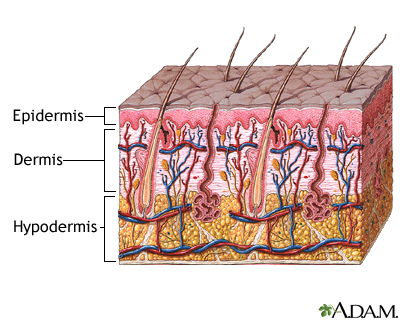Health Library
Sweating
Perspiration
Sweating is the release of liquid from the body's sweat glands. This liquid contains salt. This process is also called perspiration.
Sweating helps your body stay cool. Sweat is commonly found under the arms, on the feet, and on the palms of the hands.
Images

Animation

I Would Like to Learn About:
Considerations
The amount you sweat depends on how many sweat glands you have.
A person is born with about 2 to 4 million sweat glands, which begin to become fully active during puberty. Men's sweat glands tend to be more active.
Sweating is controlled by the autonomic nervous system. This is the part of the nervous system that is not under your control. Sweating is the body's natural way of regulating temperature.
Things that can make you sweat more include:
- Hot weather
- Exercise
- Situations that make you nervous, angry, embarrassed, or afraid
Heavy sweating may also be a symptom of menopause (also called a "hot flash").
Causes
Causes may include:
- Alcohol
- Caffeine
- Cancer
- Complex regional pain syndrome
- Emotional or stressful situations (anxiety)
- Essential hyperhidrosis
- Exercise
- Fever
- Infection
- Low blood sugar (hypoglycemia)
- Medicines, such as thyroid hormone, morphine, drugs to reduce fever, and medicines to treat mental disorders
- Menopause
- Spicy foods (known as "gustatory sweating")
- Warm temperatures
- Withdrawal from alcohol, sedatives, or narcotic painkillers
Home Care
After sweating a lot, you should:
- Drink plenty of fluids (water, or fluids containing electrolytes such as sports drinks) to replace sweat.
- Lower room temperature a little bit to prevent more sweating.
- Wash your face and body if the salt from sweat has dried on your skin.
When to Contact a Medical Professional
Contact your health care provider if sweating occurs with:
- Chest pain
- Fever
- Rapid, pounding heartbeat
- Shortness of breath
- Weight loss
These symptoms may indicate a problem, such as overactive thyroid or an infection.
Also call your provider if:
- You sweat a lot or sweating lasts for a long time or cannot be explained
- Sweating occurs with or is followed by chest pain or pressure
- You lose weight from sweating or often sweat during sleep
Related Information
HyperthyroidismMenopause
Absence of sweating
Hyperhidrosis
References
Chelimsky T, Chelimsky G. Disorders of the autonomic nervous system. In: Jankovic J, Mazziotta JC, Pomeroy SL, Newman NJ, eds. Bradley and Daroff's Neurology in Clinical Practice. 8th ed. Philadelphia, PA: Elsevier; 2022:chap 107.
Hall JE, Hall ME. Body temperature regulation and fever. In: Hall JE, Hall ME, eds. Guyton and Hall Textbook of Medical Physiology. 14th ed. Philadelphia, PA: Elsevier; 2021:chap 74.
McGrath JA. The structure and function of skin. In: Calonje E, Brenn T, Lazar AJ, Billings SD, eds. McKee's Pathology of the Skin. 5th ed. Philadelphia, PA: Elsevier; 2020:chap 1.
BACK TO TOPReview Date: 4/24/2021
Reviewed By: David C. Dugdale, III, MD, Professor of Medicine, Division of General Medicine, Department of Medicine, University of Washington School of Medicine. Also reviewed by David Zieve, MD, MHA, Medical Director, Brenda Conaway, Editorial Director, and the A.D.A.M. Editorial team.
 | A.D.A.M., Inc. is accredited by URAC, for Health Content Provider (www.urac.org). URAC's accreditation program is an independent audit to verify that A.D.A.M. follows rigorous standards of quality and accountability. A.D.A.M. is among the first to achieve this important distinction for online health information and services. Learn more about A.D.A.M.'s editorial policy, editorial process and privacy policy. A.D.A.M. is also a founding member of Hi-Ethics. This site complies with the HONcode standard for trustworthy health information: verify here. |
The information provided herein should not be used during any medical emergency or for the diagnosis or treatment of any medical condition. A licensed medical professional should be consulted for diagnosis and treatment of any and all medical conditions. Links to other sites are provided for information only -- they do not constitute endorsements of those other sites. © 1997- 2021 A.D.A.M., a business unit of Ebix, Inc. Any duplication or distribution of the information contained herein is strictly prohibited.
